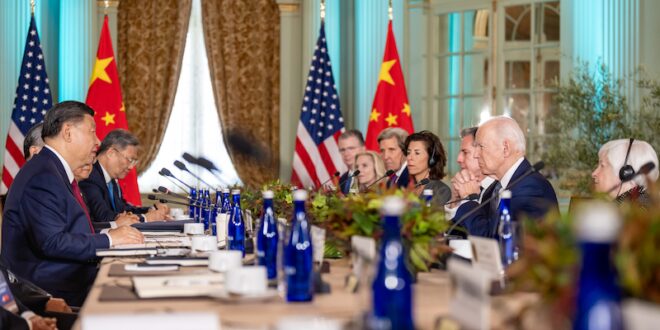As 2024 draws to a close, the stability of US–China relations is fragile at best. Even this fragile stability cannot be sustainable after Donald Trump’s victory in the US presidential election. But there may be a silver lining. People in the United States, China and other countries will likely fear escalating tensions and oppose further confrontation.
The year began with some modest optimism following the stabilising San Francisco summit between Chinese President Xi Jinping and US President Joe Biden in November 2023. The meeting indicated the possibility of real progress in cooperation on some issues, occurring halfway through the US Trade Representative’s statutory four-year review of Trump’s tariffs. Some observers believed that the Biden administration would find it in US interests to lift at least some tariffs on China, given their controversial results.
Senior officials from both nations maintained a sense of normalcy and stability in their diplomacy. President Xi and President Biden held a phone call in April and met in person at the November APEC Leaders’ Summit in Lima. They reaffirmed their commitment to maintaining dialogue and careful management of this complex relationship.
Meanwhile, high-level meetings continued, including US Treasury Secretary Janet Yellen and Secretary of State Antony Blinken’s separate visits to China in April and Defense Secretary Lloyd Austin’s meeting with his Chinese counterpart in May. Both countries’ economic officials and military officers also conducted dialogues on topics of shared interest and concern in more institutionalised settings and cooperated on issues such as climate change, fentanyl trafficking and repatriation of illegal immigrants.
But the relationship has remained largely confrontational. The United States has continued to pursue its policy of strategic competition with China, and China has enacted countermeasures. The Biden administration did not make much effort to improve the relationship. The review of Trump’s high and counterproductive tariffs on Chinese imports did not produce recommendations for meaningful tariff reductions.
The Biden administration spent much time and energy devising ways to implement the policy of strategic competition — or confrontation — with China. These included incentives promoting near-shoring and friend-shoring in the production of certain commodities, and additional high-tech export restrictions against China.
The administration also added more Chinese companies to the restrictive US Bureau of Industry and Security’s Entity List and prohibited US investment in China’s high-tech sectors. The administration has sold more and better weapons to Taiwan. Biden’s State Department even issued a travel warning for China until relaxing it on 27 November 2024. The administration has also tried to rally other countries to develop common security and economic policies against China.
The US Congress has been busy drafting various anti-China statutes and resolutions, ranging from providing more support to Taiwan to suspending China’s permanent normal trade relations with the United States. Both the administration and Congress have threatened sanctions against China over its alleged support for Russia as its battlefield odds amid the invasion of Ukraine shifted in Russia’s favour.
Despite US pressure, China has remained strategically defiant. It has accelerated efforts to diversify its trade relations away from the US market. It has intensified indigenous technology development to counteract US export restrictions and continued to advocate for free trade through initiatives like the Regional Comprehensive Economic Partnership and through applying to join the Comprehensive and Progressive Agreement for Trans-Pacific Partnership.
China expanded cooperation with Russia, deepening trade and conducting joint military exercises despite US frustration. Beijing has also promoted international cooperation through the BRICS bloc and the Belt and Road Initiative. While demanding that the United States observe its commitments regarding Taiwan under the three foundational US–China communiques, China increased military activity around Taiwan in response to perceived US and Taiwanese provocations. The country has also accelerated its military modernisation programs to deter potential US intervention.
These interactions have contributed to uncertainty in bilateral trade, relatively declining technological import dependence, reduced foreign investment, and increasingly negative public sentiment.
Even the fragile stability may be ending with Donald Trump’s victory in the 2024 US presidential election. The second Trump Administration is likely to present even more serious challenges to the US–China relationship given his political track record and the policy inclinations of some key cabinet appointees.
The relationship’s trajectory will likely be defined by increased tariffs on Chinese exports to the US, more controls on high-tech exports to China and more Chinese companies added to the Entity List. Trump’s presidency will likely also obstruct people-to-people exchanges, intensify provocations in the Taiwan Strait and reduce diplomatic communication. Under these circumstances, the risk of accidental military conflict would drastically increase.
But challenges often come with opportunities. Further deterioration of the US–China relationship poses serious risks for both countries and the world. Trump’s campaign promise to impose 60 per cent tariffs on Chinese imports would have dire consequences if implemented. It would trigger further inflation in the United States, massive job losses in both countries, global trade disruption and lower the threshold for China to undertake potential retaliatory actions.
Beijing could refuse to cooperate with Washington to reduce fentanyl trafficking, expand military actions in the Taiwan Strait, pursue an arms race or offer support for global activities against US interests. Such prospects may motivate US citizens and the international community to resist further escalation in tensions.
If the mutual benefits of cooperation cannot rescue US–China relations, they may ironically be salvaged by people of both countries and the international community against efforts to escalate confrontation for fear of the catastrophic consequences of any potential confrontation.
 Eurasia Press & News
Eurasia Press & News




